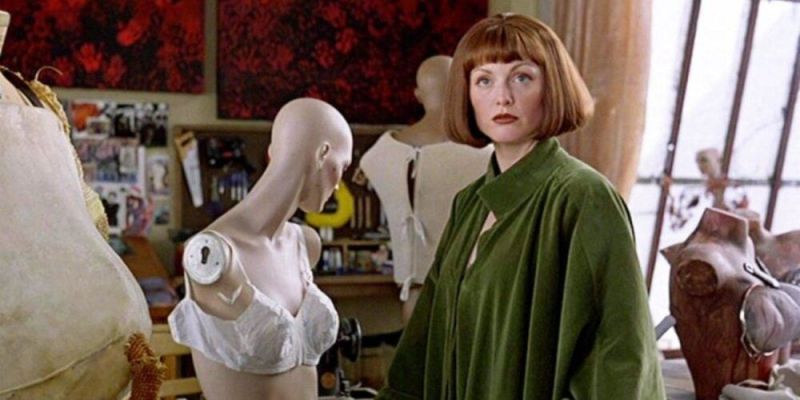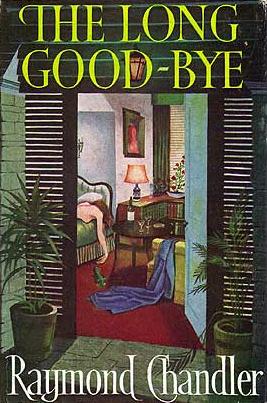If Hollywood and Southern California in general could be thought of as important characters in the Three Investigators books (as, ahem, investigated last time out) then they are certainly key to the hard-boiled ‘tough school’ novels of Raymond Chandler. In many ways the landscapes are characters that people the texts just as much as series detective Philip Marlowe. Place informs person, person becomes place. Fact becomes fiction. Memory becomes twisted and the Time Machines of media seduce us into believing things that may not be true based on the available evidence.

Take ‘The Big Sleep’ for example. In my mind, Humphrey Bogart’s portrayal of Marlowe was certainly the first time I was exposed to Raymond Chandler, although it is difficult to prove this. The ‘genome’ Internet search facility of the BBC makes the nailing down of potential suspects easy, yet the results simply throw up more uncertainty. ‘The Big Sleep’ was screened on BBC2 at 11.35pm on a Saturday night in 1979, which would have made me 13 years old. Now as much as I would like to pretend (and in the past, certainly have) that I was a hipped-up and switched-on teenager, the truth is that it is highly unlikely I could ever have seen the film at this point. My protective parents simply would not have allowed me to still be out of bed at such a time, never mind be stuck in front of the television set. Another option then is two years later, when the film was again screened on BBC 2, this time as part of a season of Howard Hawks pictures. The start time of 8.15pm on a Thursday in July makes it more plausible until one takes into account the fact that at 9pm the sole television in our house would be religiously tuned to BBC1 for The Nine O’Clock News. One other fact that blows this possibility entirely out of the water is that ‘Butterflies’ was on at 8pm on BBC 1, and my mum would certainly have been settled in front of that. When, then, could I possibly have seen ‘The Big Sleep’? The next date of broadcast on the BBC is 1993, by which point I was living in Devon, struggling through a first year of teaching, and the memory that shimmers in my mind is certainly of having seen Bogart do his Marlowe thing when I was an impressionable teenager. It’s a conundrum.
This ad hoc investigation is interesting to me, I think, because it suggests that time is a slippery customer and memory of it an unreliable conduit. The ‘facts’ then are most likely that I have imagined this teenage viewing of ‘The Big Sleep’ as part of some elaborate construction of an alternative self, rooted in those youthful desires to be something we are not. It strikes me that this is an essential part of being young, although exactly where you draw the defining lines of ‘youth’ in terms of years is up for grabs.

Something I do remember with vividness though is when, in my first year of teaching, I rather foolishly volunteered to take a Year 11 assembly (bear with me on this). One of the reasons I did this, I believe, was to confront the terror I still felt at standing up in front of large(ish) audiences. A class of 30 I could just about handle, but the idea of some 270 fifteen and sixteen year olds would have been scarier than seeing The Green Ghost. So what did I talk to them about? Well, I started off by playing ‘Blank Generation’ by Richard Hell and The Voidoids, then wittering on about how the great uncertainties of our/their teenage years can be an opportunity to try on different personalities, to search uncomfortably but also uncompromisingly for who and what we want to be, rather than what our parents or teachers think we ought. I also read an extract from a Lester Bangs interview with Hell, which was something about the nature of being a teenager, about how they are the worst years of our lives full of zits and whatever, which raised a ripple of laughs. Anyway, when I’d stopped rambling and the bell for afternoon lessons rang, the hall rather unexpectedly erupted in applause. This was, I was reliably informed, unheard of. Unsurprisingly, perhaps, it remains as one of the most pleasurable memories of some three decades of teaching.
I’m certain there were some kids in that assembly audience who forgot anything I’d said the moment I’d said it. Some too who would have thought me attention seeking, trying to look ‘cool’ or whatever. There may be more than a grain of truth in that. Some desperation to be seen to be something other than what I knew/know myself to be, which is something minor and largely forgettable. It is the same reason I am writing this some thirty three years later, no doubt. And that’s fine. The tension between reality and fantasy, dreaming and waking, fact and fiction is central to existence. Well, central to mine at least. I couldn’t shake it if I tried. And goodness knows I’ve tried.
We’re straying off the path here, aren’t we? Wasn’t this meant to be about Raymond Chandler? Or at least about when I could first have seen ‘The Big Sleep’? That’s the thing though, isn’t it? I have no idea when I could have first seen ‘The Big Sleep’ or ‘The Maltese Falcon’ or ‘Double Indemnity’ or ‘Murder My Sweet’ of any of those Noir films. The reality however is almost irrelevant next to the perception, which is rooted in an imaginary, constructed teenage period of indeterminate length. Something too, doubtless, about ‘The Big Sleep’ being tied up with the Scottish band Simple Minds, with whom I have had a complicated relationship through my life. Of course I say complicated but it is really quite simple. I loved them and then I hated them, before eventually maturing into a place where I could filter what I found uncomfortable and enjoy again what I once had found so mesmerising. Their song ‘Big Sleep’ is certainly one of those things I now, once more, find astonishingly beautiful. It is a song that pulsates and shimmers, full of the seductive sorrow of lost youth, lost love, lost memory, lost connection.
In many respects then it is similar to the Raymond Chandler novel, for these themes of loss are certainly central to the text. There is similarity too in that both song and novel are quite preposterously epic. Note the lack of capitalisation, which is as a hint at a smaller, human scale grandeur that Simple Minds, to my mind, would lose as they became more successful, but that Chandler retained, and indeed honed, in all of his further work.

Chandler’s The Big Sleep’ is flawed of course, and that is part of its charm. Both the novel and the film are just a shade too long, although I dare say that 21st Century film audiences would think two hours a ‘short’. The novel has the feel of several short stories bundled together, which is hardly surprising because that’s pretty much what Chandler was doing with his long form works. That patchwork, cut-up collagist approach is most evident, I think, in ‘The Big Sleep’ and this surely lends it a bizarre, almost Dadaist quality. It’s notable then that when the Coen brothers made their magnificent homage to the novel in their ’The Big Lebowski’ film of 1998, they threw some crazy Germanic techno conceptual artists into the mix, as if the brothers recognised the connections from the novel into the realm of the cut-up. Was Julianna Moore channeling Hannah Hoch in the film? Who knows. But it would make some kind of (non)sense if she had been.
Chandler’s short stories are great pieces, and for someone who has an avowed distaste for the short story in general, and the crime/detective short story in particular, that is really saying something. The tough school hard-boiled form of the stories published in the Black Mask pulp magazine work magnificently well however. It’s like the form was waiting for the American pulps to really explode into life. Bam! Pow! Whaaaam! Those stories are like Pop Art comic strips in pared back prose, all rusty shivs and snub nosed revolvers to the guts. Flowers in the dustbin. Under the paving stones, not exactly the beach but rather blood stains and withered hopes. And the American tough school short stories work in a way that English detective short stories do not simply because, for the most part, there is not really any mystery to solve. There is no puzzle other than the one of how to make a fast buck or escape an early death. There are primitive impulses in the tough-school short stories that are ultimately rewarding in such brief explosions of action. The English, by contrast, feel tiresomely trapped in attempts to condense the pleasure of the long-form detective puzzle into something that is not really fit for purpose. This is just a feeling I get, you understand, a set of personal prejudices and preferences not really backed up by evidence other than the frustrations felt when leafing through another one of those British Library Crime Classics collections of themed short stories. When will I learn?
‘The Big Sleep’ then is all marvellously disjointed and nonsensical. Of course Chandler plays the Christie card at the end when Marlowe, in what might just be a parody of Poirot, lays out all the facts and shows us his workings in the margins. If I’m being gleefully cynical too I might say that Chandler is taking a pop at Mr John Dickson Carter Dickson Carr’s predilection for complexity and absurd cleverness. Marlowe never comes across as clever. Instead Marlowe is smart. Except when he isn’t, and then he’s showing us how human he is, which is maybe even better than being clever. Or smart.
Is there something then in ‘The Big Sleep’ about the need humans seem to have for making connections between things, and how ridiculous that can often be? How it can lead us into traps and blind alleys just as well as to enlightenment? There is something magnificently random (to coin a popular early 21st Century phrase) in ‘The Big Sleep’ which is exaggerated by Marlowe/Chandler making his explanation of the connectivity between those apparently random elements. One comes away from ‘The Big Sleep’ feeling that there is no real resolution to anything, that all the ‘making sense’ of things is just so much flim-flam and that it is in the embracing of the disjointed where enlightenment can be found. Don’t try too hard. Listen to the universe. Some things just happen… The Dude in ‘The Big Lebowski’ would undoubtedly agree with this.

Let’s get back to that idea about the nature of the American tough school of writing as found in the pages of the pulps, though, because there can be a temptation to applaud the gritty ‘realism’ of the writing as being ‘authentic’. This is something I do not hold with, for there is no such thing as authenticity in art. That’s a bold statement, I know, but there it is. Now I suspect that in 2024 there is much less discussion around the nature of authenticity in art forms than there was towards the end of the naughties. Back then it was all the rage, as I recall, to praise certain things as being ‘authentic’ and to damn others as being ‘manufactured’. This mostly happened in the realms of music criticism, specifically in the area of ‘alternative’ music where it was utilised as a means of elevating the critic’s and therefore the audience’s perceived taste. It was all utter nonsense of course, and Yuval Taylor and Hugh Barker punctured the whole thing in their tremendous ‘Faking It’ book of 2007. Barker in particular is an interesting character to me, not least because of his work with the band Animals That Swim whose quirky, literate pop music remains criminally underrated and invisible. In 2012 he also published a book about the history of Britain’s (read England’s) curious obsession with hedges, but that is (literally) another story.
That notion of the authentic voice is certainly one that prevailed around the reception to the tough school of American pulp writing in the first half of the twentieth century. There was a feeling that the writers were writing of, and from The Street, that they were telling the authentic stories of the blue-collar worker, the hard working man and the devious, scheming woman. Gender and racial stereotypes guaranteed to split the atom of 21st Century opinion, yes, but also peculiarly tantalising period pieces. The writers of these short sharp stories gave off the feeling that they knew what they were writing about, that they were living on the same streets, eking out the same tough lives, striving for the same American Dream whilst simultaneously shining a flashlight on the corruption dwelling at the heart of that very dream. The filth and the fury. No surprise then that there would be something similar in the Rock’n’Roll aesthetic of the 1950s and in the Punk explosion of the late 1970s, peculiar flamboyant eruptions of outrage and Working Class rebellion that would both be so rapidly subsumed into the Capitalist Machine.
Dashiell Hammett might have once served some time as a Pinkerton detective agent before starting to write his hard-boiled prose, but the majority of the others were not writing from ‘experience’ of The Street at all, but rather were working to the template of the tough school form that very rapidly took shape. Having said that I do not hold with notions of authenticity it should be clear that I do not say this pejoratively. Indeed, whilst re-reading some of these old Black Mask stories, and Chandler’s novels in particular, it strikes me that there is a strong correlation between them and the the work of Bruce Springsteen, which is high praise indeed.

Now my relationship with the work of Bruce Springsteen is even more easily described than the one I have had with Simple Minds. In the most basic summation it goes something like: decades of hatred bleeding into a year or two of begrudging admiration (starting around 2003 when I heard a cover of ‘Born In The U.S.A.’ by obscure Scottish indie band Ballboy) blossoming into obsessive love from around 2015 onwards. The obsessive love has weathered in the past couple of years into something that I’d like to think of as more mature and measured, but it is no less passionate for all that.
It may have been that coming late to an appreciation of Springsteen allowed me to sidestep, to a large extent, the sense of his work as being some kind of authentic blue-collar documentary of Americana, but I admit that I laughed out loud when, during his acclaimed ‘Springsteen on Broadway’ performances of 2017, he explicitly ‘admitted’ to having made it all up. The ‘authenticity’ that was baked into the mythology of Springsteen was a sham, an artifice, an illusion. Smoke and mirrors. Well of course it was. Yet this does not make it any less powerful or less enticing to us. If anything it makes the magic even more special, takes the ‘everyman/person’ notion inherent in the narrative of the work and turns it inside out. The everyday becomes spectacular because it actually isn’t the everyday, but an artistic interpretation, where the deceit of manipulation is so cleverly disguised that the line between the mediated and the ‘real’ is magically dissolved. Each becomes the other in a never ending dance.
I see this dance in the work of Raymond Chandler too, particularly in ‘Farewell My Lovely and his last ‘proper’ novel ‘The Long Goodbye’ (it’s fairly easy to sidestep the posthumously published ‘Playback’). In both these books Chandler finesses the rough edges of ‘The Big Sleep’ into something that is not exactly polished, but certainly somewhat more cohesive. Marlowe still moves through the world of the novel in such a way that he attracts coincidences from which he moulds connection and meaning, but the plots at least feel a little more considered. This is particularly true of ‘The Long Goodbye’ which is a masterpiece of detective fiction masquerading as a literary novel or vice versa. More than ever with ‘The Long Goodbye’ this is Chandler casting a withering eye over the landscape of America in its supposed post-war prosperity and finding it morally lacking. The book is threaded with observations and asides, many of them put in the mouth of Marlowe, that rail on the iniquity of wealth and the systemic corruption that supports and drives that iniquity. Not that Chandler seems particularly interested in making political observations or taking Political sides. Rather ‘The Long Goodbye’ is something of an existential take on ‘civilised’ society. It is a novel that is unceasingly bleak, its blackest depths lightened by Marlowe’s sharp one-liners that merely act to emphasise the depths into which he, and we, are made to look.

It is largely accepted that ‘The Long Goodbye’ is Chandler getting up close and personal to himself and, on the evidence of the two characters (alcoholic writer Roger Wade and alcoholic wastrel Terry Lennox) not finding much in himself to admire. As if to add insult to (personal) injury, the things that Marlowe does find to like in these characters turn out to be flickers of potential smothered by lies and deceit. Like I say, it is not exactly cheery stuff, which is no real surprise given that the novel was written as his wife Cissy was slowly suffering through a long illness. Cissy died the year after the novel was published. A long goodbye indeed.
For all that it remains a thoroughly readable book, its determinedly existential outlook made bearable and even perversely enjoyable by donning the garb of the detective novel. Robert Altman’s 1973 film of the novel managed much the same kind of trick, though this time oddly because it was positioned as a satirical take on the Noir/hard boiled school. If I remain somewhat unconvinced by Altman’s film it is likely because I think I have something of a mistrust of satire, and ‘issues’ based comedy generally. Much of it leaves me cold at best, irritated at worst. That’s no doubt the intended effect, and it all points to my being a cold and humourless fish, but there we are.
Not that Altman’s film is a comedy of course, and actually it no longer seems as irritating as it once did, and that is to its credit. Or perhaps to mine, who knows. It still feels definitively a 1970s picture in that it is pedestrian, vague, values visual style over narrative to a frustrating degree and outstays its welcome. Then again, I have yet to see an Altman film I did not think this about, which doubtless just goes to prove what an illiterate philistine I am.
If you had asked me twenty years ago I would have told you that Altman’s film is the poorest of all the cinematic adaptations of Chandler’s novels and massively overshadowed by the novel itself. That shadowing is still significant, but the film has at least managed to embed itself in the pack of pictures that are at least as good as each other. Or as bad, depending on which way the wind is blowing and how violently I happen to be considering the differences between the written and the filmic text, none of which I really know anything about except for instinctual reactions and feelings that hover somewhere on the edge of intelligence. As I am proving here.

My Texan friend William has told me that he remembers a critic making a comment about Altman’s film, something along the lines of Marlowe running around a lot but not really solving anything and this being evidence of Altman’s deconstruction of the Marlowe character. Which kind of begs the question of whether the critic in question might actually have read ‘The Long Goodbye’ or indeed any Chandler novel. ‘Running around a lot but not really solving anything’ is pretty much Marlowe’s raison d’être. It is what Marlowe does. All the time. His purpose is not to solve anything in the traditional detective novel sense, but to assemble meaning from disjointed elements. His is a character that acts as a conduit for events. Things happen to, and around Marlowe. He’s literally an agent of reaction, an ingredient that brings situations to their head. The whole ’solve a mystery’ thing is so far down the list of important elements in the Tough School of writers to the point of being an irrelevance, or maybe an irritation that the writer needs to scratch occasionally, knowing that scratching just makes the itch worse.
Reading Raymond Chandler in 2024 (or whenever) is to realise that whilst the challenges (and rewards) of existence may take on slightly different forms throughout history, the underlying irritations remain timeless. One of the roles of great artists then is perhaps to take on the burden of recognition, to make work that addresses those irritations and in so doing create a balm for the rest of us. Chandler’s preposterous tales of the human condition paradoxically create pockets of calm for us to linger in. He mined the dark recesses so that we might find them marginally less frightening. That’s a lot to be thankful for.
